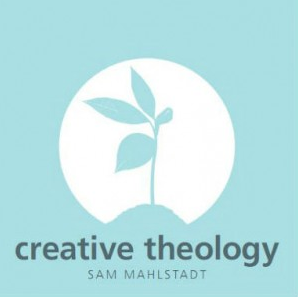 I’m excited to share a discussion I recently had with Sam Mahlstadt, the author of Creative Theology, a book I really enjoyed. Christian culture has put a huge emphasis toward artistic expression and the importance of creativity within the church, but what Sam does in this book is create an under-girding theological understanding for why we should even think this way. It’s a top notch book. At the bottom I’ll have details for how you can win a copy of the book.
I’m excited to share a discussion I recently had with Sam Mahlstadt, the author of Creative Theology, a book I really enjoyed. Christian culture has put a huge emphasis toward artistic expression and the importance of creativity within the church, but what Sam does in this book is create an under-girding theological understanding for why we should even think this way. It’s a top notch book. At the bottom I’ll have details for how you can win a copy of the book.
—
Tyler: As I read the book I quickly noticed the direct connection between the layout of the book and the point that was being made in written word. How did you go about writing a book that would engage the reader as strong visually as it does through the written word?
SM: Early in the process, I was planning on writing a typical 60,000 word book. As I got into the writing, though, I realized that the form not only didn’t fit the content, but that it subtly worked against it. At that point, I had the idea to cut down the content into the most essential concepts and write them as sparse as I could. I knew I wanted to work with a layout designer to give it a unique look, and ended up working with two designers, one who did the initial typeset, and another who added the color and hand-drawn elements. I was fortunate to work with capable designers who understood the spirit of the book and shaped the reading experience.
Tyler: You tell readers that each person is made a “creative.” How do you go about explaining the artistic role people have in their lives (especially since so many would not consider themselves creative)?
SM: I think you have to start with a clear distinction between creativity and art. The definition I used in the book identified creativity as being innate, and art as using that creativity to create something designed to be consumed. So all artists are creative, but not everyone is an artist.
Tyler: You talk a lot about the innate human need to be in the ruggedness of nature as it connects us with the Creator. How did you come to discover this while living in Des Moines? (I grew up in Minneapolis and the endless fields of the Midwest have their own beauty but it isn’t a rugged beauty)
SM: I think living in the middle of cornfields and flat terrain is why I have such a keen appreciation of rugged nature. Spending time in Colorado hiking through Rocky Mountain National Park was a grace I didn’t realize I received at the time. During that trip, I experienced beautiful and pristine nature and felt the grandness of God in a way I hadn’t before.
While we can see the work of the Creator all around us, there is something about being in rugged nature that serves to establish perspective in our lives as they relate to the work of the universe. The story God is telling involves all of creation, and I believe that’s easier to remember when you experience nature.
Tyler: In Blaine Hogan’s afterword he speaks to the role we have of living creative lives. Can you think of any practical steps the non-artistic thinker can make to move toward living this way?
SM: I think it starts with acknowledging the creative in and around us, and then celebrating that creativity. This isn’t just about art either. People are by nature and necessity very creative. Non-artistic thinkers have to solve problems that require a unique perspective and/or solution everyday. They also give love and grace everyday, in which they are responding by using the creative life source that sustains all of creation.
I would say rather than trying to do 10 creative things a day, start by noticing creativity around you. Take a photo of the sunrise, write down the act of grace that was shown to you, tear out an inspiring quote or image from a magazine, or write a thank you note to someone.
It’s often said that creativity is a muscle, and you need to use it for it to grow, and acknowledging the small acts of creativity in our lives engages and builds that muscle.
Tyler: As a guy who self-published this book, what simple advice do you have for people who have words to share but no traditional publisher to work with?
—
I’m going to give away one digital and one print copy of the book to two separate people. To win a copy of Sam’s book, Creative Theology, you can do one, two, or three (to increase your odds) things: Tweet this interview, Share this post on Facebook, Comment on this post (use the buttons to the left for sharing). I’ll pick the winners Friday afternoon the 27th.